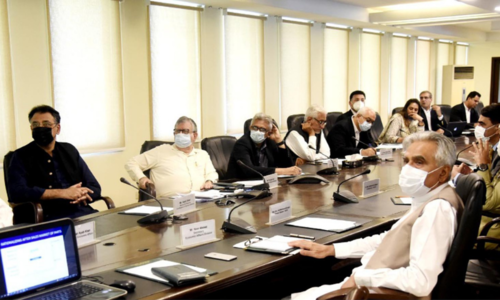A meeting of the Sindh task force on Covid-19, presided over by Chief Minister Murad Ali Shah, decided on Saturday to keep vaccination centres in the province closed tomorrow (Sunday) amid a shortage of coronavirus vaccines.
The meeting was also attended by Health Minister Dr Azra Fazal Pechuho, Education Minister Saeed Ghani, Information Minister Nasir Hussain Shah, Adviser to CM Murtaza Wahab and a number of other officials, according to a statement issued by the Chief Minister's House after the meeting.
The provincial government also decided to reopen primary schools from June 21 while shrines, amusement parks and indoor gyms will reopen from June 28.
The meeting was informed that the coronavirus positivity rate in the province stood at 3.9 per cent while it was 8.08pc in Karachi and 4.3pc in Hyderabad.
The weekly average positivity rate in different districts of Karachi was recorded at 14pc in District East, 10pc in District South, 9pc in District Central, 8pc in District West and 7pc in District Malir and District Korangi.
The meeting was informed that there had been a reduction in the number of coronavirus cases in the province lately.
The chief minister remarked that cases would continue falling as long as the public kept following standard operating procedures (SOPs).
Vaccines
"There will be no vaccination tomorrow because of a shortage of coronavirus vaccines," Shah told the meeting.
The meeting was also informed of the vaccines that will be received by Sindh in June, a breakdown of which is as follows:
- 1.5 million Sinovac doses to be received on June 21.
- 700,000 doses of Cansino vaccine to be received on June 23.
- 400,000 doses of PakVac to be received on June 23.
- Doses of Sputnik V vaccine to be received in the last week of June.
A total of 3,243,988 vaccine doses have been received by Sindh so far, of which 2,873,857 have been used, according to the statement.
No vaccination centre closed
A day earlier, the Sindh government clarified that no vaccination centre had been closed in the province, including Karachi, despite a shortage of vaccines, adding however that the timings of some centres had been curtailed as the province awaits its stocks to be replenished.
In response to queries regarding reports of vaccine shortages and closures of centres, Chief Minister Syed Murad Ali Shah told Dawn.com that only 225 mobile vaccination units had been temporarily shut, which should not be confused with vaccination centres.
He added that the Sindh government had earlier allowed 60 private hospitals in the province to administer vaccines, but "that facility has also been closed because of a lack of availability of vaccines."














































